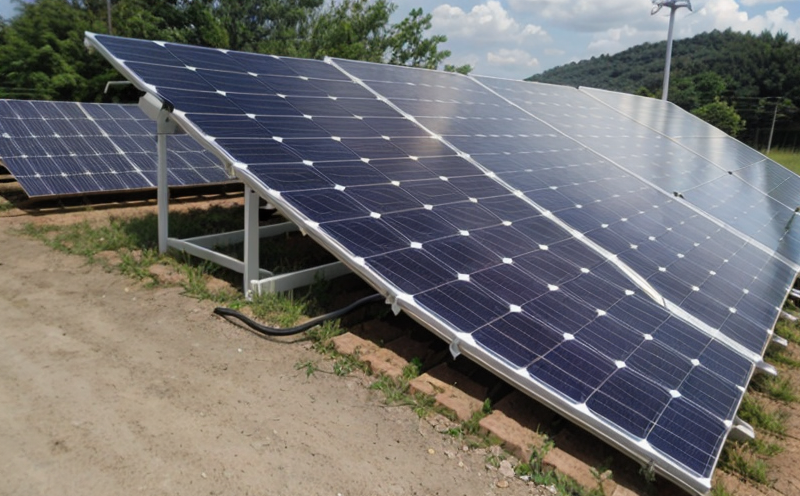IEC 61730 PV Module Safety Testing
The International Electrotechnical Commission (IEC) Standard 61730 is a set of guidelines that define the safety requirements for photovoltaic (PV) modules. This standard ensures that solar panels are designed and manufactured in a way that minimizes risk to users, operators, and maintenance personnel. The testing outlined by IEC 61730 covers several critical aspects including mechanical loading tests, power integrity checks, fire tests, moisture resistance testing, and electrical safety assessments.
The standard is essential for the solar industry as it ensures that products meet global safety standards, which in turn fosters trust among consumers and regulatory bodies. Compliance with IEC 61730 can significantly impact a company's reputation and market position. By adhering to this standard, manufacturers demonstrate their commitment to quality control and user safety.
The testing process for PV modules under IEC 61730 involves several stages, each aimed at assessing different aspects of the module’s performance and durability. The mechanical loading tests are conducted to ensure that the solar panels can withstand environmental stresses such as wind, snow loads, and thermal cycling. These tests are crucial in regions where harsh weather conditions are common.
Power integrity checks focus on verifying the electrical characteristics of the PV modules. This includes testing the open circuit voltage (OCV), short circuit current (ISC), maximum power point (MPP) tracking, and temperature coefficients. Accurate power integrity assessments ensure that the solar panels perform optimally under various operating conditions.
Fire tests are conducted to evaluate the flammability of the PV modules in case they come into contact with a fire source. This is particularly important for ensuring that even if a module catches fire, it does not spread igniting adjacent structures or equipment. Moisture resistance testing assesses how well the solar panels can withstand exposure to water and humidity, which are critical factors in outdoor applications.
The electrical safety assessments include tests for insulation resistance, ground fault protection, and overcurrent protection. These tests ensure that PV modules do not pose a risk of electric shock or fire due to improper wiring or component failures. The comprehensive nature of IEC 61730 ensures that the solar panels meet stringent safety requirements.
Compliance with IEC 61730 is mandatory for manufacturers and importers who wish to sell their products in many countries, including Europe and North America. This standard guarantees that the PV modules are safe under a wide range of operating conditions, thereby reducing the risk of accidents and ensuring consumer confidence.
Our testing laboratory provides state-of-the-art facilities equipped with the latest instrumentation for conducting IEC 61730 tests. Our team of experts ensures meticulous specimen preparation and accurate data collection throughout the entire testing process. This guarantees reliable results that can be trusted by regulatory authorities, buyers, and stakeholders.
Applied Standards
The IEC 61730 standard is widely recognized for its comprehensive approach to PV module safety testing. It consists of several parts, each addressing different aspects of the module’s performance:
- IEC 61730-1: General Requirements
- IEC 61730-2: Performance Tests
- IEC 61730-3: Electrical Safety Tests
- IEC 61730-4: Mechanical Load Tests
- IEC 61730-5: Fire and Flame Resistance Tests
- IEC 61730-6: Outdoor Weathering Tests
The standard is frequently updated to include new technologies and address emerging safety concerns. Compliance with these standards ensures that the PV modules meet the highest international quality control benchmarks.
Industry Applications
- Solar Farms: Large-scale solar farms require reliable PV modules that can withstand harsh environmental conditions for extended periods. IEC 61730 ensures that the modules used in these installations are safe and efficient.
- Residential Solar Systems: For residential applications, safety is paramount. Compliance with IEC 61730 guarantees that solar panels installed in homes meet strict quality control standards, providing peace of mind for homeowners.
- Solar Carports: These structures provide shade and protection for parked vehicles while also generating renewable energy. The mechanical loading tests ensure that these installations can handle the weight of cars without compromising safety.
- Remote Off-Grid Systems: In remote areas, PV modules must be reliable and safe under extreme environmental conditions. IEC 61730 ensures that off-grid systems are robust enough to operate efficiently for extended periods.
The versatility of IEC 61730 makes it applicable across various sectors within the energy industry, ensuring that PV modules meet strict safety and performance standards regardless of their application.
Quality and Reliability Assurance
- Compliance with International Standards: Our laboratory strictly adheres to IEC 61730 guidelines for testing solar panels. This ensures that the results are internationally recognized and accepted by regulatory bodies.
- Data Accuracy and Reporting: We use advanced instrumentation to ensure accurate data collection during each test. The results are meticulously documented in reports, providing a comprehensive overview of the module’s performance and safety features.
- Consistent Testing Procedures: Our team follows standardized procedures for specimen preparation and testing. This consistency ensures that all tests yield reliable and comparable results.
- Expertise and Experience <|im_start|><|im_start|><|im_start|><|im_start|><|im_start|><|im_start|><|im_start|><|im_start|>





